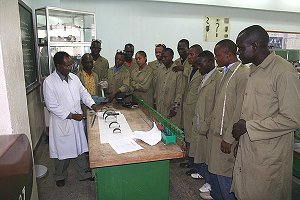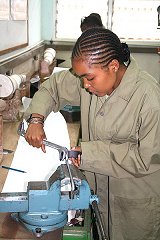Diploma Course in Orthopaedic Technology
The Diploma Course in Orthopaedic Technology was established in 1981 through joint co-operation and partnership between the Tanzania Training Centre for Orthopaedic Technologists (TATCOT), the Tanzanian Ministry of Health and Gesellschaft fur Technische Zusammenarbeit (GTZ), the Agency for Technical Cooperation of the Federal Republic of Germany. The course is intended to enrol students from Tanzania and other English speaking African countries as well as from other interested countries.
Entry qualifications and other requirements
The course has a capacity to admit a maximum of 15 students each year. To qualify for admission to the course, the applicants must possess an Ordinary Level Form IV Certificate or equivalent with at least three Credit passes in any of the following science subjects:
- Physics
- Biology
- Mathematics
- Chemistry
Engineering subjects offered at technical secondary school are also acceptable as a third credit.
 1st year Diploma course:Mr. I. Majo demonstrating design of kafo following drawing
1st year Diploma course:Mr. I. Majo demonstrating design of kafo following drawing
Other requirements
Age: 18 years and above
Sex: Both Male and Female candidates are eligible to join the course.
Health: Candidates must possess a medical certificate indicating that he/she is mentally and physically fit to undertake the course
Language: Medium of communication is English. Candidates must exhibit competence in written and spoken English
Certification: Successful candidates must present their original Birth Certificate, Secondary School Certificate and/or other relevant Certificates as a pre-requisite for admission to the course.
Photographs: Students should present (12) passport size photographs for their Resident Permit, Identity Card, Registration, Academic Transcript and Diploma.
Application dates: Applications should be submitted to the Principal, TATCOT by the 30th April of the year of entry.
- Candidates must confirm their place to the Principal in writing not later than 31st May.
- Late applications will normally be considered for the following academic year.
Course description and objectives

The Diploma Course in Orthopaedic Technology comprises theoretical, laboratory and clinical practice. The clinical practice includes the clinical examination and evaluation of individual patients in order to prescribe and deliver the appropriate prosthesis or orthosis to each individual patient. The broad objectives of the diploma course in Orthopaedic Technology are to provide the graduate with:
- A clear concept of the role and responsibilities of Orthopaedic Technologists towards patients, colleagues and the clinical team;
- A good level of theoretical knowledge and practical competency to safely and efficiently carry out their professional duties in providing the most common prosthetic and orthotic devices to people with neuromuscular disorders;
- A knowledge of the application of locally available materials and the adaptation of technology to suit different social and environmental conditions;
- The ability to operate and maintain the tools, machines and equipment used in a prosthetics/orthotics or technical orthopaedics department.
- An understanding of the principles of workshop management and supervision of staff
Course duration and subjects
The duration of the course for the Diploma in Orthopaedic Technology is three years commencing in October and ends in July each year. The course comprises of 576 hours equivalent to 50 credits for theoretical hours and 2700 hours equivalent to 60 credits for practicals.Within the practical hours; there are 576 hours of clinical placement of which 208 hours are for clinical field attachment outside the centre.This clinical field attachment can either be in the country or in the country of residence after identifying and liasing with centres with capacities and qualified supervisor(s) in prosthetic and Orthotics and Management.
| code | Course | Lecture | Practical | Total (hours) | |||
|---|---|---|---|---|---|---|---|
| Hours | Creidts | Hours | Creidts | Hours | Creidts | ||
| BS 001 | Basic Sciences | 135 | 9.0 | 90 | 2.0 | 225 | 11.0 |
| AO 002 | Ankle Foot Orthotic Science | 165 | 11.0 | 186 | 4.1 | 351 | 15.1 |
| Total | 300 | 20.0 | 276 | 6.1 | 576 | 26.1 | |
| code | Course | Lecture | Practical | Total (hours) | |||
|---|---|---|---|---|---|---|---|
| Hours | Creidts | Hours | Creidts | Hours | Creidts | ||
| AP 002 | Ankle Foot Prosthetic Science | 16 | 1.0 | 180 | 4.0 | 196 | 5.0 |
| TT 002 | Trans-tibial Prosthetic Science | 90 | 6.0 | 230 | 5.1 | 320 | 11.1 |
| GH 002 | General Health Education | 45 | 3.0 | 15 | 0.3 | 60 | 3.3 |
| Total | 151 | 10.0 | 425 | 9.4 | 576 | 19.4 | |
| code | Course | Lecture | Practical | Total (hours) | |||
|---|---|---|---|---|---|---|---|
| Hours | Creidts | Hours | Creidts | Hours | Creidts | ||
| KO 003 | Knee Ankle Foot Orthotic Science | 90 | 6.0 | 486 | 10.8 | 576 | 16.8 |
| Total | 90 | 6.0 | 486 | 10.8 | 576 | 16.8 | |
| code | Course | Lecture | Practical | Total (hours) | |||
|---|---|---|---|---|---|---|---|
| Hours | Creidts | Hours | Creidts | Hours | Creidts | ||
| KD 004 | Knee Disarticulation Prosthetic Science | 30 | 2.0 | 186 | 4.1 | 216 | 6.1 |
| TF 004 | Trans-femoral Prosthetic Science | 30 | 2.0 | 270 | 6.0 | 300 | 8.0 |
| LM 004 | Leadership and Management | 60 | 4.0 | - | - | 60 | 4.0 |
| Total | 120 | 8.0 | 456 | 10.1 | 576 | 18.1 | |
| code | Course | Lecture | Practical | Total (hours) | |||
|---|---|---|---|---|---|---|---|
| Hours | Creidts | Hours | Creidts | Hours | Creidts | ||
| PO 005 | Prosthetics and Orthotics Management | 65 | 4.3 | 481 | 10.7 | 546 | 15.0 |
| HR005 | Health System Research | 30 | 2.0 | - | - | 30 | 2.0 |
| Total | 95 | 6.3 | 481 | 10.7 | 576 | 17.0 | |
| code | Course | Lecture | Practical | Total (hours) | |||
|---|---|---|---|---|---|---|---|
| Hours | Creidts | Hours | Creidts | Hours | Creidts | ||
| CP 006 | Clinical Placement | - | - | 576 | 12.8 | 576 | 12.8 |
| Total | - | - | 576 | 12.8 | 576 | 12.8 | |
During the third year of the course there is an opportunity for patient contact and clinical experience at KCMC Orthopaedic workshop which is situated adjacent to TATCOT. This consists of fully supervised and timetabled clinical experience with patients who have a range of medical conditions and disabilities requiring prosthetic and orthotic treatment.
The final year of the course also includes a supervised clinical attachment of 8 weeks in approved Orthopaedic Workshops. This clinical attachment is supervised by a fully qualified Orthopaedic Technologist, Prosthetist, Orthotist or Prosthetist/ Orthotist as is appropriate. A balanced and comprehensive programme as outlined by TATCOT is followed during this period of clinical attachment.
Exemptions
Exemption from attending a particular course of study may be granted subject to satisfying the necessary requirements. A request must be submitted to the relevant Academic Board. Candidates exempted this way will be credited for the course.
Course fees
The course fees should be paid in US$ or equivalent directly to the Bank and Account Number indicated on the letter of admission to the course. The yearly course fees should be paid in total before the beginning of the course, or in 2 installments by special arrangement. The course fees for foreign students in US$ are as follows:
| Course fees | ||||
|---|---|---|---|---|
| Description | 1st Year | 2nd Year | 3rd Year | |
| Tuition fee | 6,500 | 6,500 | 6,500 | |
| Stationery | 200 | 200 | 200 | |
| Uniforms | 125 | 125 | 125 | |
| Hostel rent | 1,000 | 1,000 | 1,000 | |
| Resident permit | 250 | 250 | ||
| Field Work | 500 | |||
| ICT | 500 | |||
| Medical care | 250 | 250 | 250 | |
| Total | 8,825 | 8,075 | 8,825 | |
The monthly allowances or stipend for students during the period of the course will depend on their parents or sponsoring agencies. However, it is suggested that the foreign student's monthly allowances should be sufficient to cover food, pocket money and other daily expenses.
The student will be required to deposit US$20 (non-Tanzanian) and T Shs 3,000 (Tanzanian) at the beginning of the course against the equipment issued at the beginning of the course. This deposit will be refunded at the end of the course upon return of the equipment.
There are accommodation possibilities in the campus and in Moshi, see our section "Facilities and Accommodation" on this Website.
Non-Tanzanian students should possess all the necessary travelling documents including a valid visa from the Tanzanian High Commissioner or Embassy in their respective countries and a valid passport for the duration of the course before departing to Tanzania. The return air ticket and other travelling costs have to be met by the sponsoring Institution or Agency.
Institutions or individual candidates interested to join the course should seek recommendations of sponsorship.
College Regulations Students are required to abide by the laid down regulations and By-laws of the College during their whole period of study. There are general and academic regulations as outlined by College. These regulations and By-laws will be given to the students on the date of reporting to the College.
Application form
Download the application form (PDF-document, 9 pages, 24KB)
Information Flyer
Download the Flyer for the Diploma Course in Orthopaedic Technology (PDF-document, 2 pages, 458 KB)

 SHORT COURSE 2023/24
SHORT COURSE 2023/24